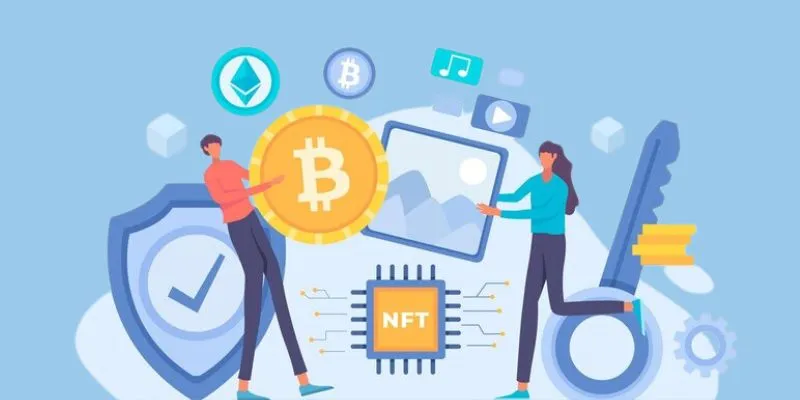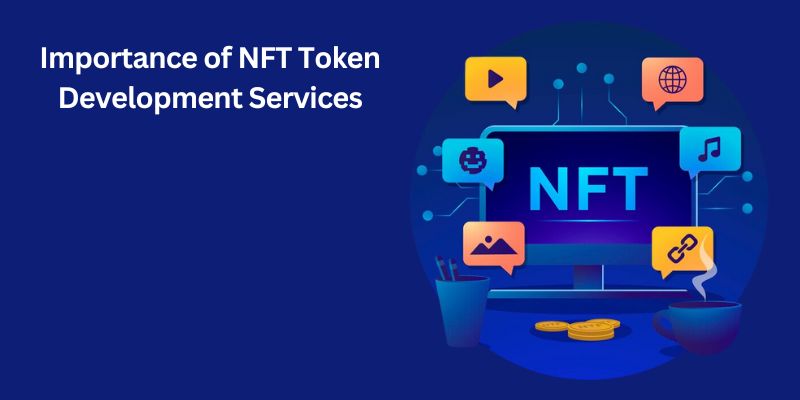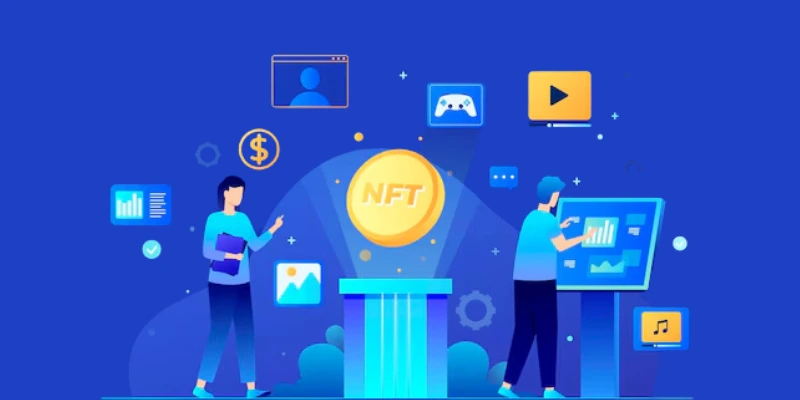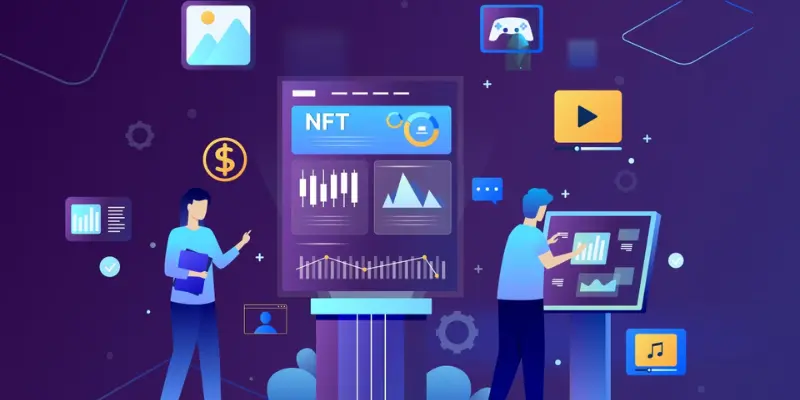In the digital age, tokens have become effective instruments for innovation, allowing businesses to tokenize their assets, streamline transactions, and develop new value-based exchange methods. Token development is now the foundation of blockchain technology. It offers unimaginable opportunities for businesses to take advantage of the benefits of decentralized financing (DeFi),non-fungible currency (NFTs),and many more.
Tokenization, as its basis, is the conversion of digital or real-world assets into tokens stored on the blockchain. This creates liquidity, improves transparency, and allows for fractional ownership. Tokens can represent company shares, real estate property, or unique collectibles; they are a versatile and effective asset representation method.
The process of NFT development starts with conceptualization and planning. Understanding the coin's function and purpose is vital. Do you want it to serve as a means of exchange, asset store, or governance token within a decentralized environment? The definition of tokenomics, including distribution, supply, and incentive mechanisms, will be the underlying element for its future success.
The next step is to implement the technology. The best blockchain platforms, for example, Ethereum, Binance Smart Chain, or Solana, should be selected based on factors such as security, scalability, and support for the ecosystem. The development of smart contracts plays an essential role in governing the token's operation, which includes transfer, issuance, and governance guidelines.
Revolutionizing Digital Ownership
NFTs, also known as Non-Fungible Tokens, which are digital assets that signify the ownership or evidence of the authenticity of a particular object, artwork, music, or collectible item, as well as virtual real estate on the blockchain. Unlike any other cryptocurrencies, such as Bitcoin or Ethereum, which can be exchanged and have identical worth, NFT development is distinctive and unchangeable. This distinctiveness can be seen as a change in many fields, including gaming and art, to music and real estate.
Also Read: NFT Marketplace Development: The Future of Digital Ownership For 2024
Role of NFT Marketplace Development Services
NFT Marketplace development services are essential in bringing new NFT platforms to market. They include creating, developing, and implementing NFT marketplaces that meet the specific needs of collectors, creators, and businesses. From concept to implementation, expert development teams work with customers to develop cutting-edge solutions that promote engagement, transparency, and scalability.
Why to Create Your NFT Token?
Making an individual NFT Token for 2024 is an attractive option for many compelling reasons, reflecting the ever-changing trends and developments in the digital world. Different factors are driving the growth of NFT marketplace development services this year, which reflect the current trends shaping the landscape of technology, including:
Diversification of Asset Portfolios:
NFT marketplace development company offers a unique opportunity to diversify portfolios of digital assets. By tokenizing various forms of content like music, art, virtual real estate, and many more, creators and investors can diversify their portfolios to include more than traditional assets, optimizing their investment strategy overall.
Monetization Opportunities for Creators:
NFT marketplace development services enable creators in various industries to earn money directly from their digital works. Artists, musicians, developers of games, as well as content creators can use NFTs to get immediate payment for their work, decreasing dependence on traditional intermediaries and allowing for new revenue streams.
Gaming Industry Innovation:
The gaming industry has adopted NFTs to ensure ownership of the assets used in games. NFT token development company lets gamers buy or sell virtual goods across various games, creating a vibrant community of digital asset ownership inside the gaming industry.
Virtual Real Estate and Metaverse Advancements:
Alongside the growing metaverse concept, NFTs are essential in identifying the ownership of virtual land and properties. NFT development associated with virtual real estate can allow dedicated developers to participate in the growing metaverse economy, where users can immerse themselves in digital experiences.
Digital Identity and Authentication:
NFTs offer an unsecured and verified method to signify digital identities and authenticate digital assets. They are used in the certificates, licenses, and credentials, creating the security of transparent and tamper-proof evidence of ownership or achievement.
Integration with Web3 Technologies:
The constant development of Web3 technologies and decentralized applications (DApps) provides a favorable setting for NFT development. Integrating NFTs with Web3 improves application decentralization, user autonomy, and the overall user experience across various platforms and applications.
Social Engagement:
NFTs create direct links between creators and their fans and increase community involvement. Token holders are often an integral part of a community united by shared values and interests, leading to more collaboration, loyalty, and appreciation for the creator's work.
Cross-Platform Integration and Interoperability:
NFT standards like ERC-721 or ERC-1155 enable interoperability, which allows NFTs to transfer information and work across different platforms and ecosystems effortlessly. This improves the value and efficiency of NFTs, making them more attractive to developers as well as users.
The process of creating NFTs in 2024 provides an exciting opportunity to interact with a dynamic and rapidly changing digital world. NFT tokens could be used to broaden portfolios of investments, allow creators to earn money directly from their work, or contribute to the advancement of technology like the metaverse. You can NFT marketplace development services that will continue shaping the direction of digital ownership and interactions.
Read About: Proven Strategies for Successful NFT Game Development 2024
The Future of Art and Collectibles
The unfolding of blockchain technology has revolutionized many sectors and created an entirely new world of art and collectibles. The use of non-fungible tokens (NFTs) has enabled an electronic ownership system and a unique identification of art and collectibles. This opens up new exciting opportunities for collectors, creators, and investors.
Famous creators and artists like Beeple, Grimes, and Kings of Leon have embraced NFTs. Beeple's digital artwork, "Every Day: The First 5000 Days," was auctioned off for $69 million at Christie's auction. Kings of Leon released their album as an NFT, with exclusive bonus items to buyers. In addition, platforms like NBA Top Shot and Rarible have seen increased demand for NFT-based collectibles; some items are selling for thousands of dollars.
Potential for the democratization of artwork and collectibles with NFTs:
One of the main advantages of NFT development is their ability to create a more democratized market for collectibles and art. Traditional art and collectibles are available only to a few with substantial resources. Yet, NFTs allow for fractional ownership and the possibility of trading and selling digital art and collectibles. This provides new investment possibilities for a wider variety of individuals and may lead to a greater variety in the market for art and collectibles.
Critiques and Challenges to the acceptance of NFTs in the world of art:
While NFT development may change the market for art and collectibles, their implementation also has some criticisms and pitfalls.
Certain critics believe that NFTs promote the commercialization of art and undermine the traditional art market. There are also worries about the environmental impacts of NFTs as their production and sale use large amounts of energy.
Despite these issues, using NFTs in the market for art and collectibles is an exciting new development that has the potential to transform the market. As technology advances and becomes more accessible, observing how NFT development affects the art and collectibles market will be fascinating.
Read Also: NFT Marketplace Development: Everything You Need to Know About
Role of Blockchain and Crypto in NFTs

Blockchain technology provides a distributed, safe method of storing transactions that is ideal for the digital world. One of its most fascinating applications is the use of non-fungible tokens (NFTs),which provide an efficient and secure method of tracking ownership and traceability of assets digitally.
NFTs are distinctive digital assets representing various things, such as artwork, collectibles, and tweets. They are typically created using blockchain technology, which creates an unalterable and secure document that identifies ownership and transfer.
Through blockchain technology, NFT development can offer a degree of digital ownership that was previously unattainable. They permit collectors and creators to verify ownership and authenticity. This is especially important in digital art, where plagiarism and piracy can be risky.
Role of Cryptocurrencies in NFTs
Cryptocurrencies play a crucial role in NFTs since they are a method of trading these unique digital assets. In many instances, NFTs are bought and sold using cryptocurrencies such as Bitcoin or Ethereum, also based on blockchain technology.
One of the main advantages of cryptocurrencies used for NFT transactions is their speed and effectiveness. Provide. Transactions can be executed swiftly without intermediaries such as banks or other financial institutions.
The advantages of Blockchain Technology for NFT ownership and verification. One of the most significant advantages of using blockchain technology to facilitate NFT ownership and authentication is transparency and indefiniteness. Every transaction is recorded on a public ledger, which makes it easy to track any ownership or transfer transactions of the digital asset.
This transparency aids in preventing counterfeiting and fraud. Because each NFT is unique and distinct in the blockchain, no one can create counterfeit or duplicate versions of a previously owned asset.
Read About: NFT Marketplace Development:Steps to Building a Profitable Platform
Importance of NFT Token Development Services

To fully utilize the capabilities of NFT tokens, it's essential to collaborate with a reputable NFT token development company. These professionals have the knowledge and expertise to efficiently develop, deploy, and manage NFT tokens. Here are a few reasons why hiring a reliable NFT token development company is crucial:
Technical Expertise
NFT development involves intricate technical aspects, including innovative contract development, token minting, and blockchain integration. Proficient NFT marketplace development services for token creation include experts knowledgeable about blockchain technology and can ensure flawless execution for your NFT project.
Customization and Scalability
Each NFT project is distinct and needs specialized solutions that meet specific needs. NFT marketplace development services for developing tokens can provide different options for customizing the NFT tokens with the company's goals and brand. Furthermore, these services could help you scale your NFT marketplace development services platform to support the growing number of users and handle higher volumes of transactions.
Security and Auditing
Security is a top priority for the security of NFTs. Secure NFT token development company employ strong security measures to protect your digital assets and the users' information. They conduct comprehensive security audits to discover weaknesses and minimize them, thus ensuring the security and reliability of the NFT ecosystem for users and creators.
Ongoing Support and Upgrades
The NFT market is rapidly evolving, frequently surfacing new technology and standards. When you partner with the NFT marketplace development service, you will have access to ongoing support and updates that ensure your platform is up-to-date with the most current developments. This will ensure that the NFT project remains relevant and sustainable.
Must Read: Unlocking The Best NFT Marketplace Development Company
Applications and Use Cases of NFT Marketplaces Development Services
As we examine the wide world of NFTs, we see their uses far from the digital art world. NFTs have been able to find creative applications across many industries, challenging the concept of ownership and opening up new opportunities for companies and people alike.
Digital Art and Collectibles
NFTs are a game changer for digital artists. They offer an open platform that allows artists to trade their works directly to buyers. Artists now have access to a worldwide public without the need for intermediaries and establish an immediate connection to their patrons.
Gaming and Virtual Assets
In gaming, NFT development has revolutionized the concept of game assets. In gaming ecosystems, players can own and exchange virtual items such as characters and real estate. This enhances the gaming experience and creates an entirely new source of revenue for gamers.
Intellectual Property Protection
NFTs provide a safe and transparent method of expressing your ownership rights to digital intellectual property. Creators of content, authors, and musicians can use tokens to represent their work and ensure that they control the use of their work and can receive acknowledgment and payment.
Tokenized Real Estate
The real estate market is evolving with the tokenization of property. NFTs could represent shares or ownership of real-world properties, facilitating fractional ownership and streamlining the complicated procedure in property deals.
Identity and Credentials
NFTs are a way to verify certificates that prove the authenticity of certifications, qualifications, or memberships. These can be used in education, professional certifications, and various membership-based organizations to provide secure documents.
Event Tickets and Experiences
Utilizing NFTs for ticketing is an authentic and secure process for events. Each NFT development is a genuine event ticket that prevents scalping and fraud. Furthermore, NFTs can extend to giving exclusive experiences in connection with occasions.
Conclusion
As the NFT marketplace continues to develop, NFT marketplace development services are a vital element in shaping the future of the NFT ecosystem. By harnessing the possibility of blockchain technology and creative solutions, they fuel the pace of innovation, stimulate creativity, and redefine the notion of ownership in the modern age. Whether you're an artist collector or an entrepreneur, using NFT marketplaces will open the door to endless possibilities and propel us toward a decentralized and connected digital economy.













Share this blog